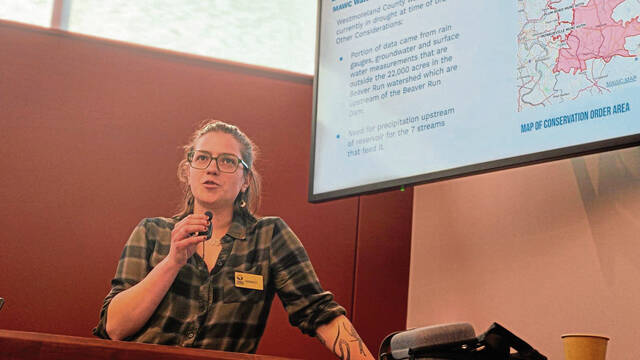Environmental groups scrutinize Beaver Run Reservoir water usage in the wake of drought watch
The recent drought watch in Westmoreland County caused residents, water authority officials and businesses to take a closer look at their water consumption as Beaver Run Reservoir dipped lower than usual during the summer and fall before being replenished by recent precipitation.
Nonprofit citizen environmental group Protect P-T began taking a closer look at the water consumed by the major natural gas fracking companies in the area and discovered the three largest companies — Olympus, CNX and Apex — drew 328 million gallons of water from MAWC’s reservoirs in 2023, according to state statistics.
“That’s the equivalent of every household in the entire town of Vandergrift during a year,” said Tom Pike, environmental policy advocate at Protect P-T.
Members of Protect P-T, the Three Rivers Waterkeepers and the Mountain Watershed Association held a community meeting in Allegheny Township on Thursday night where they laid out recommendations about reservoir water withdrawal that they hope the MAWC will consider.
“When oil and gas companies pull water, it does not come back into the system,” said Hannah Hohman, programs coordinator for Three Rivers Waterkeepers, which does water monitoring, pollution response, water quality analysis and data mapping for the region’s waterways. “And, as fracking has increased, they are drawing more water per year.”
Pennsylvania Department of Environmental Protection figures estimate that, where the average unconventional drilling well drew between 2 million and 7 million gallons of water per year in 2008, by 2022, it had increased to between 14 million and 39 million gallons per year.
“Taking it for fracking makes this water single-use,” Pike said. “After that, it is essentially trash.”
There are companies that treat fracking wastewater, raising its quality to the point where it can be reused by the fracking industry.
But, unlike residential wastewater, it cannot be restored to a high enough quality for reintroduction into the water table.
“It’s not just our drinking water, it’s our fire protection water, as well,” said Calvin McCutcheon of Apollo. “I think (the companies) should be paying three, four, five times the amount for their water.”
“After the drought watch, we’ve started to scrutinize where this water is going,” said James Cato, regional organizer for the Mountain Watershed Association. “Not just in our homes, but in the way it’s used by businesses.”
Protect P-T began circulating a petition at recent meetings that members plan to present to MAWC officials with recommendations for reservoir water withdrawals.
They include:
• Pausing the withdrawal of water for fracking at the same time residential water customers are asked to undertake conservation measures.
• Capping fracking companies’ annual withdrawal at half the amount of their 2023 usage.
• Charging a higher fee for customers who permanently use up water. Drilling company CNX pays $8.57 for every 1,000 gallons of water it uses, the highest rate MAWC charges, according to authority officials.
MAWC officials did not attend the meeting. MAWC spokesperson Matt Junker said authority officials attended Protect PT’s previous meeting regarding the reservoir’s water levels and have plans to meet with the group in late March.
Pike said he’s hopeful the authority will be responsive.
“These (withdrawal) contracts are renegotiated annually, so there’s an opportunity to do this,” he said.
Patrick Varine is a TribLive reporter covering Delmont, Export and Murrysville. He is a Western Pennsylvania native and joined the Trib in 2010 after working as a reporter and editor with the former Dover Post Co. in Delaware. He can be reached at pvarine@triblive.com.
Remove the ads from your TribLIVE reading experience but still support the journalists who create the content with TribLIVE Ad-Free.


